
The first day of classes for Portland Public Schools is this Monday, August 27th. That means streets throughout the city will be much more crowded. One street in particular — North Flint between Russell and Broadway — will get a major uptick in traffic.
As the new site of Harriet Tubman Middle School, PPS is hoping to spread the word to the nearly 700 daily bicycle users who rely the popular section of Flint to connect between north and northeast Portland neighborhoods and the central city.
PPS has published a flyer warning about expected traffic impacts. Here’s what you need to know:
Advertisement
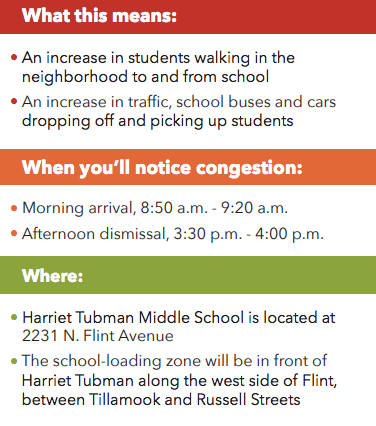
The Oregon Department of Transportation (ODOT) has also issued a statement about the start of school to remind road users to be extra cautious.
As many of you know, school drop-off and pick-up zones are some of the most stressful and dangerous places to ride. Parents and guardians will risk nearly anything to get their cars as close as possible to the front door of a school. If everyone just chills out and slows down, conditions would be much safer.
— Jonathan Maus: (503) 706-8804, @jonathan_maus on Twitter and jonathan@bikeportland.org
Never miss a story. Sign-up for the daily BP Headlines email.
BikePortland needs your support.



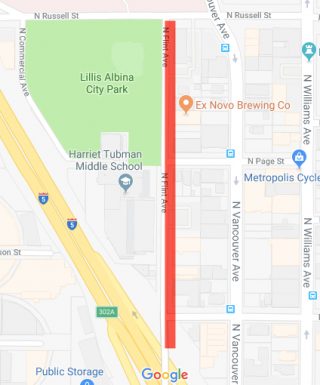
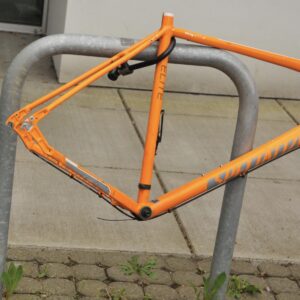
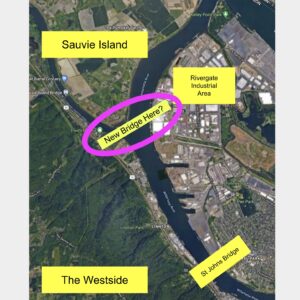
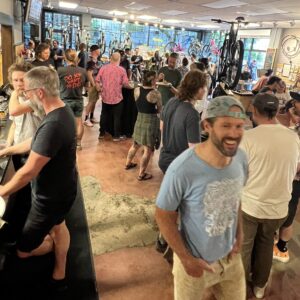
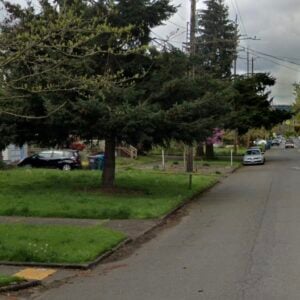
Thanks for reading.
BikePortland has served this community with independent community journalism since 2005. We rely on subscriptions from readers like you to survive. Your financial support is vital in keeping this valuable resource alive and well.
Please subscribe today to strengthen and expand our work.
Our childrens’ daycare, which we bike to, is just down the street, on the corner of Flint and Broadway, so the street has additional parent/child traffic. I have seen some wild fast cars turning north onto Flint from Broadway. Wish PBOT would consider some additional traffic calming there…
There are two new speed tables on that part of Flint, installed a couple of months ago now.
Speed bumps, actually. Two more are pending north of Tillamook when the BES work is complete, as part of the Tillamook Greenway.
I know. I bike over them when I take my kids to school. It doesn’t stop the dangerous traffic at the intersection of Broadway and too-fast turns both onto and off of Flint. The whole intersection is a speed race as cars try to evade having to wait for bikes (on Broadway) on their right, the cars coming off the i5 offramp, cars coming down Broadway, etc.
That special time of year when parents teach their children it’s acceptable to be irresponsible, selfish, and dangerous because “mornings are stressful and we’re late.”
I’ve been dreading since summer break began.
Note to the PPB, Put a traffic officer in a hidden location along this school zone and ticket the Flint Street Speed Racers in to the stone age, the children and cyclists will thank you.
using a poh-lees officer instead of camera is a complete waste of resources.
if our society actually gave the tiniest @#$% about the safety of children walking/rolling to school, speed cameras would be ubiquitous in school zones.
I would also like to see automated traffic law enforcement, but not under the terms dictated by the Oregon State Legislature. Giving motorists a free pass for the first ten mph over the speed limit is terrible, imo. It makes automated enforcement next to useless as a means of taming dangerous driving.
Any data to back that up?
Is it not common sense that people shouldn’t be driving 29mph in a 20mph school zone? We need data to prove it?
” It makes automated enforcement next to useless as a means of taming dangerous driving.” Any evidence of this?
No. Do you have any evidence that cameras that allow a 10mph buffer do anything to discourage people from driving 9mph over?
“Do you have any evidence that cameras that allow a 10mph buffer do anything to discourage people from driving 9mph over?”
Crickets.
It’s obvious that drivers are not worried about a ticket.
How is it obvious?
Drive on any freeway in town.
Or just any road.
As a driver, I’ve found the freeways to be particularly frightening lately. It’s the wild west, with no sheriffs.
To the best of my knowledge, there is no such limit for tickets from dedicated speed cameras. Sadly, automated speed cameras are still essentially illegal in the state of oregon.
Perhaps you are thinking of the 11 mph limit for use of red light cameras for speed tickets:
https://www.oregonlaws.org/ors/810.434
Fixed photo radar is an automated speed camera (BH Hwy, outer Division, 122nd). In Oregon they are limited to high crash corridors. Mobile photo radar is an automated speed camera. They are permitted on any street with the use of a manned vehicle.
1) requiring that a camera be manned is not automation.
2) fully automated cameras are still essentially illegal in OR because they are only allowed in a small number of locations as a “test”.
Cameras are a sign of a police state.
Do you have a better solution to cut down on rampant and regular speeding? I’m open to effective alternatives.
I think you’ve been watching too many movies.
I was referring to an earlier comment by Soren about police states.
i made no such comment here as anyone can see by using their browser search tool.
Aug 17:
“Expensive, intermittent, and largely ineffectual enforcement is like pissing into the wind. As our society continues to become ever more unequal, theft is bound to increase. Unless we are willing to live in a police state, punishing people as a means of social change is nothing more than an exercise in sadism.”
Right. Government surveillance is just something Hollywood made up.
Speed cameras can be present in non-police states. Are the citizens of the UK living in a police state?
Actually, I would argue UK is pretty close to a police state. That country in pretty much entirely covered by closed circuit TV.
Not a very middle of the road statement.
Having visited several times, and knowing many people that live there, I don’t think it fits the definition. They have complete freedom of movement, freedom of speech, etc.
“Police state is a term denoting a government that exercises power arbitrarily through the power of the police force. Originally, the term designated a state regulated by a civil administration, but since the beginning of the 20th century it has “taken on an emotional and derogatory meaning” by describing an undesirable state of living characterized by the overbearing presence of the civil authorities.[1] The inhabitants of a police state may experience restrictions on their mobility, or on their freedom to express or communicate political or other views, which are subject to police monitoring or enforcement. Political control may be exerted by means of a secret police force that operates outside the boundaries normally imposed by a constitutional state.[2] Robert von Mohl, who first introduced the rule of law to German jurisprudence, contrasted the Rechtsstaat (“legal” or “constitutional” state) with the anti-aristocratic Polizeistaat (“police state”).[3] “
You said, “Cameras are a sign of a police state” and someone asks if you ‘d consider the UK a police state since it uses cameras, and you reply yes, because it uses cameras?
Actually, I was all set to criticize your line of thought, but now that I just wrote that I don’t know how I can.
It is quite frustrating how certain commenters here love to jeer, lob verbal Molotov cocktails, but then not only refuse to engage their detractors, but also are unwilling to offer up any alternative solutions to the problem that—in this case—speed cameras are meant to address.
I agree. And just to be clear, if someone said, “Big teeth are a sign that an animal is vicious”, and someone asked, “So are rabbits vicious?” and they responded, “Yes, because they have big teeth”, I wouldn’ t know how to criticize that line of thinking, either, but obviously it’s wrong. I’d guess any kind of diagram of the logic of it would involve drawing some sort of of line that circles back on itself.
Even if the UK is not a police state under the traditional definition, by building all the infrastructure and conditioning society to accept mass surveillance, it makes it easier for Britain to become one.
Really?
This too is a familiar rhetorical move here (perhaps the uncle of whataboutism?) -bury the conversation about the dangers of speeding by pouncing on the alleged surveillance dangers of certain flavors of enforcement, all the while offering no constructive solutions to the initial problem we were discussing.
I am sensitive to the dangers of a surveillance state, but object to the glib bait and switch here. Can’t we have a thoughtful interrogation of the initial subject (speeding, cameras) as well as a measured debate about the limits and risks of one common-enough-in-other-places tactic for enforcing speed limits?
I think the question of whether we want to install more surveillance cameras is highly relevant to the question of whether to install more speed cameras.
As I have said in the past, I would totally support the installation of more cameras with the proviso that data unrelated to specific enforcement actions not be stored. I think that’s a reasonable line to draw.
We’ve seen over and over how new police or prosecutorial powers are used far beyond what they were intended for. Recent example: using RICO laws to go after nuisance complaints related to marijuana businesses.
The best time to have a conversation about limits is before a technology becomes widespread and the police are already using it in unexpected ways.
PS The Rodney King episode was captured by news cameras which are a different thing altogether.
“PS The Rodney King episode was captured by news cameras which are a different thing altogether.”
No it was not. It was George Holliday’s camcorder footage which he sold to the local channel KTLA for $500 that documented what went down that night.
Either way, not the same thing.
Of course not; that was my point. Cameras in our world can and are used to document bad behavior by everyone. Your (and others’) surveillance state concerns should acknowledge this rather than treating the very mention of photo radar as evidence of state overreach.
I will say unequivocally that I value maintaining civil liberties above enforcing traffic law. Unequivocally.
I respect that. But surely things don’t begin to get interesting until your civil liberties run over and maim my niece; something we tell ourselves could have been avoided or prevented or rendered much less serious in a world where enforcement was a priority. Your absolutes are easy enough to assert until we have a problem (a lack of meaningful enforcement leading to flagrant behavior (in this case speeding)) when the two apparently conflict.
I support greater enforcement. I’ve said that dozens of times.
Cameras are a sign of a police state much in the way that someone breaking the law is a sign of a total breakdown of organized society.
“Cameras are a sign of a police state much in the way that someone breaking the law is a sign of a total breakdown of organized society.”
…well, a total breakdown of a police state…someone breaking the law is a sign of a flourishing free society.
So are police.
Would love to see parking/ traffic violation enforcement at the beginning of the school year at all of the schools- private and PPS- to set the standard. Impulsive drivers and children don’t mix well.
If parents get away with bad behavior, they will keep doing it all school year, believing that it is ok because no one stops them.
PBOT and PPB do this already.
All I’ve ever seen is speed limit enforcement. It’s already tough to speed during pick-up or drop-off with all the congestion. What I usually see unenforced is people parking illegally.
I also have only seen enforcement of the school zone speed limit, but no enforcement directed toward drop off/ pick up illegal parking or cross walk enforcement.
it’s “For the Children”.
OMG, we’re 2 minutes late for 3rd grade! Now you’ll never be able to get a job!
“If you’re late for 3rd grade, don’t bother showing up for 4th grade!”
ha ha
What time do classes start at Portland Public Schools? Do the high schools have different times than those stated for Harriett Tubman?
Schools are doing it wrong. There should be a lane right through the center of school so that kids can be dropped off at the front doors of their classrooms.
I think they already have a plan for the southwest corridor.
The streets within two blocks of schools should not allow drop-off/pick-up except for buses and handicapped. This behavior just makes the streets around schools so dangerous that it encourages more motorized drop-off, which creates more danger and so on.
Better yet, we really should close the streets adjacent to schools during drop-off/pick-up times. Heaven forfend we actually take the safety of our children more seriously than we take convenience for car-bound people.
Looking at the flyer it’s obvious they don’t think any children get to school via bicycle. I hope that’s not true.
It’s too dangerous with all the people driving their kids to school.
Closed circuit TV is a thing.
Police states are a thing.
But your comment does not help us understand the relationship between the two, and I would argue unhelpfully muddles the differences.
I am going to imagine that one of the chief reasons people might object to a police state is the unfairness, the bias, the arbitrariness with which violence is meted out to certain (groups of) people by enforcement arms of the state. Among the overdeveloped capitalist countries, the US has long (always?) ranked pretty high on this metric. We don’t seem to require a lot of cameras to experience plenty of the characteristics of a police state, and some of the cameras going back at least to the one that captured Rodney King’s beatings by the LAPD have been crucial in pushing back against our police state tendencies.
The U.K., by contrast, which may as you allege have a much higher saturation of CC TV cameras than we do in the US, ranks considerably better than we do when it comes to police bias. It would seem pretty important to know or understand who is looking at the footage and what they are intend to do with it before making such broad brush claims.
Care to comment?
The reason people are opposed to more government cameras is not because we are a police state but because by building the infrastructure for a police state it makes it more likely we will become one.
Who knows — we might someday get a president who disdains the rule of law, and is willing to trample all norms of governance in order to enact his agenda or protect himself. Who knows what he might do if he had access to detailed information about his political opponents’ personal lives. It’s happened before, luckily not in our country, but plenty of reasonable people warn it could happen here. Does it not make sense to proceed with caution?
Of course we should proceed with caution. But your (and others’) comments on the issue here tend to get so flustered over the camera issue that you skip right over the enforcement concerns that gave rise to the discussion. I’m just asking that you allow that both issues deserve attention.
I offered a reasonable way to move forward. Make it illegal to store the unneeded footage.
I support greater enforcement. I’ve said that dozens of times.
Jonathan – I concur with your warning. In my many years of investigating school zone traffic safety complaints…its usually caused by parents as drivers dropping off/ picking up their children. Traffic safety is a “one-way street” when it comes to these parents.